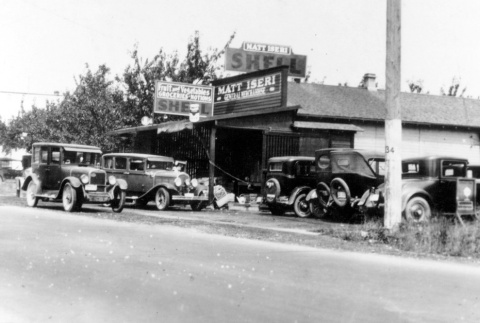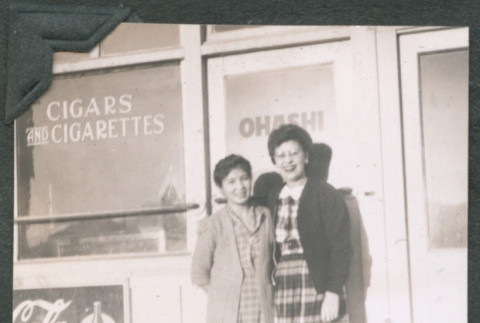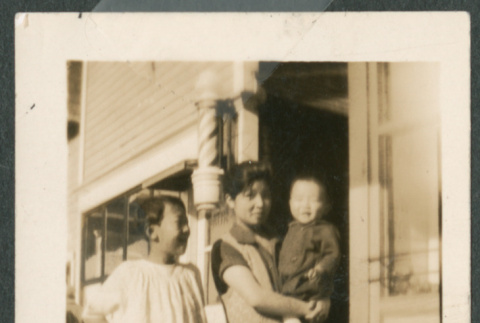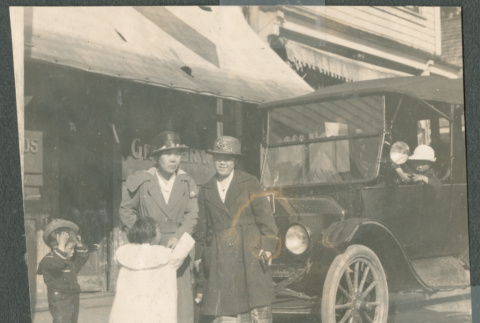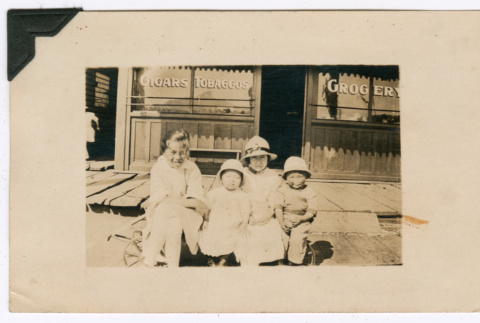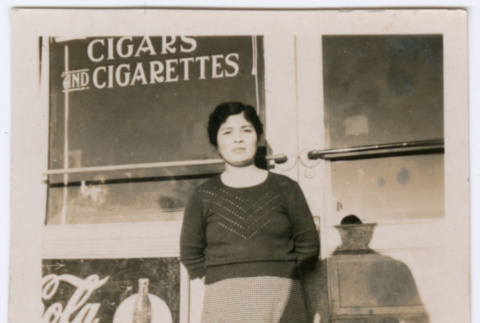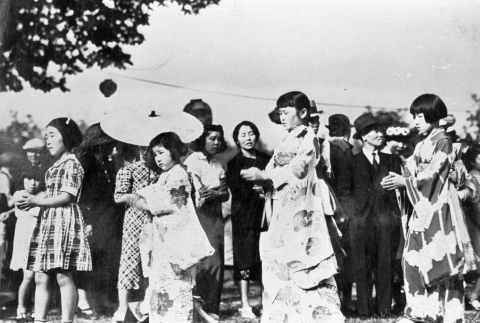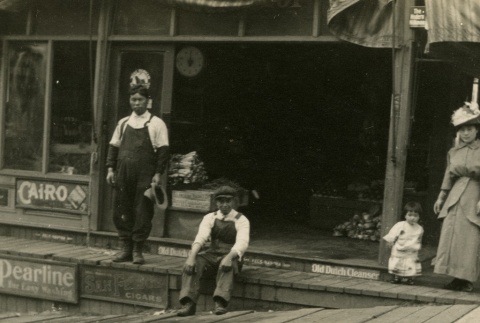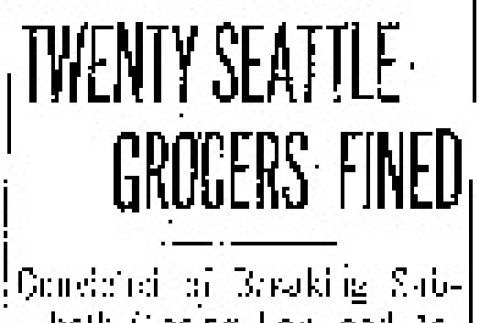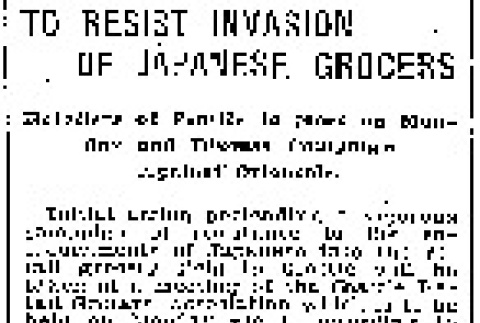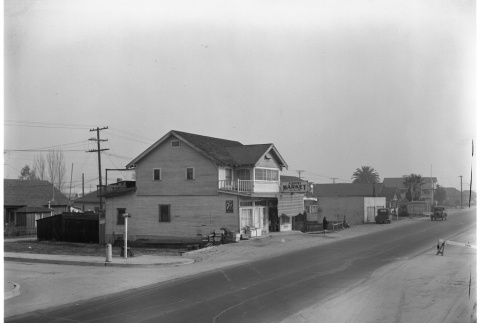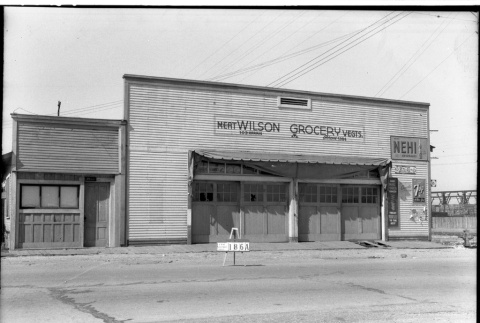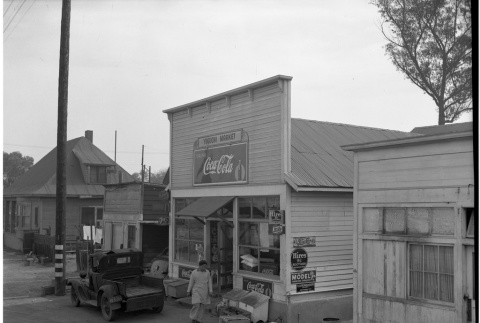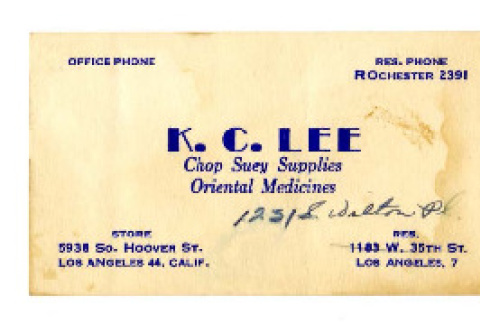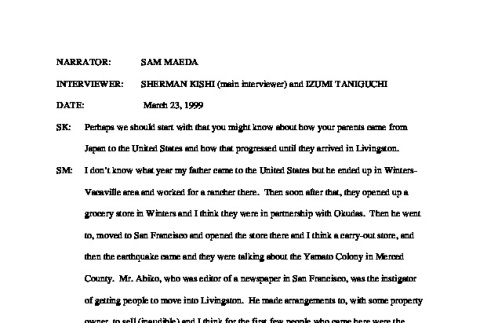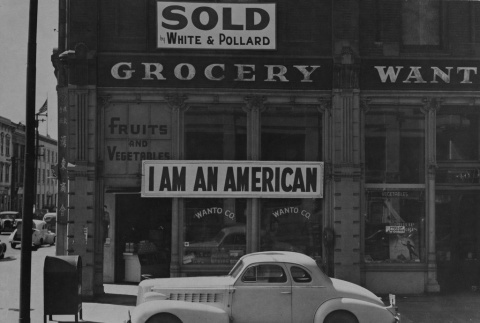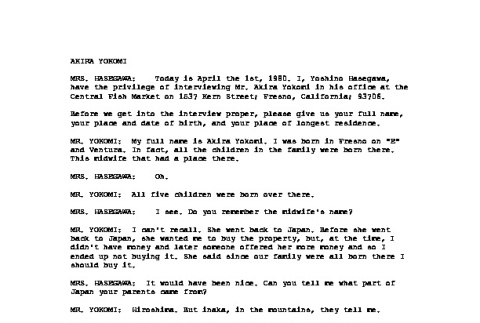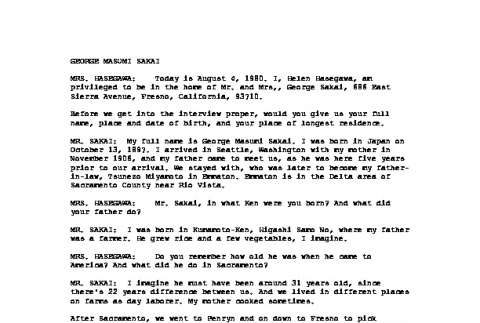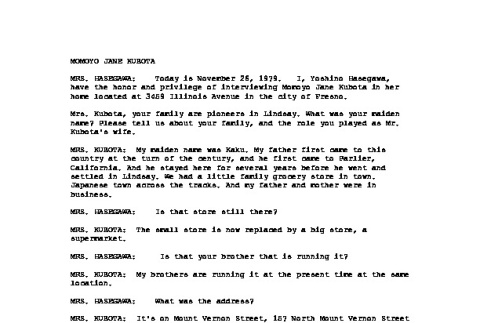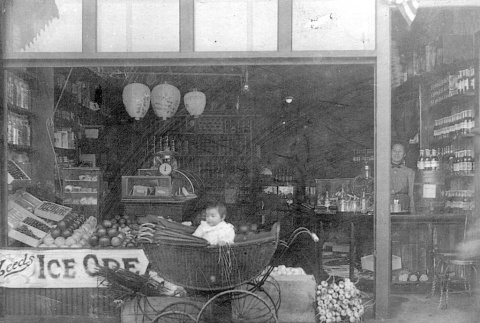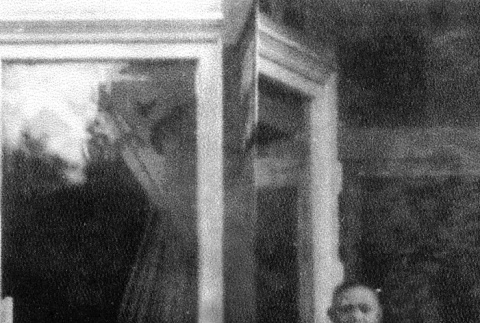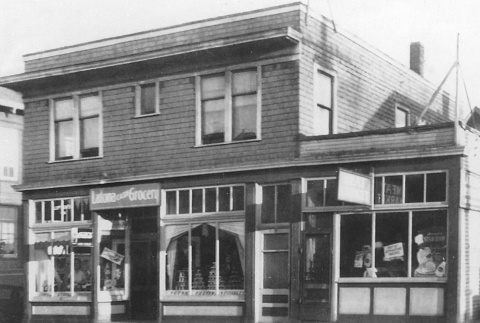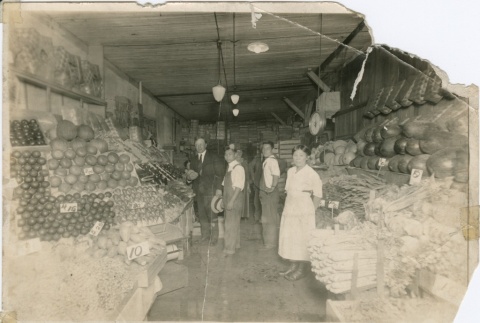Grocery stores
Industry and employment
(481)
Small business
(391)
Grocery stores
(63)
63 items
63 items
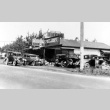
img
Issei-owned grocery store (ddr-densho-25-8)
Matahichi and Kisa Iseri immigrated from Kumamoto-ken, Japan, in the early 1900s. They became successful berry farmers in the White River Valley and also ran a small grocery store on their property. The World War II incarceration forced the Iseris to close both businesses. After the war, the Iseris settled in Ontario, Oregon, and worked as …
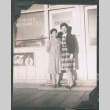
img
Komatsu (Saito) Ohashi & Irene Inman (ddr-densho-442-36)
Photograph of Komatsu (Saito) Ohashi and Irene Inman outside the Ohashi grocery store together.
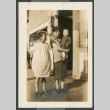
img
Tomo, Komatsu and Bob (ddr-densho-442-75)
Photograph of three people outside a store. From left to right: Tomo Ruth Ohashi, Komatsu (Saito) Ohashi, and Robert Teruo "Bob" Ohashi.
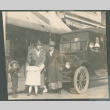
img
Ready for a drive (ddr-densho-442-311)
Photograph of Shika Ohashi (left) with an unidentified woman (right) and three young children standing around or seated in a car.
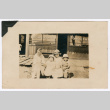
img
Ohashi's Grocery store (ddr-densho-442-55)
Photograph of four children sitting outside the Ohashi family grocery store. Post-it attached to photograph reads "Ohashi's Grocery Store" in black ink.
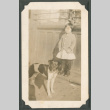
img
Tomo and dog (ddr-densho-442-69)
Photograph of Ruth Tomo Ohashi with a dog outside the family store.
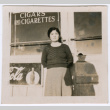
img
Komatsu (Saito) Ohashi (ddr-densho-442-68)
Photograph of Komatsu (Saito) Ohashi standing in front of the Ohashi family store. Inscribed on the back is "Mom" in blue ink.
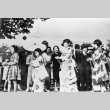
img
Grocery store owners' picnic (ddr-densho-20-14)
Japanese American grocers and their families gathered for this picnic at Jackson Park in Seattle, Washington. The picnic included dancing. Left to right: unidentified, Marianne Okawa, May Tsutsumoto, and unidentified.
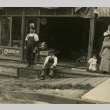
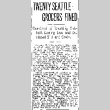
doc
Twenty Seattle Grocers Fined. Convicted of Breaking Sabbath Closing Law and Assessed $15 and Costs. (August 29, 1919) (ddr-densho-56-332)
The Seattle Daily Times, August 29, 1919, p. 2
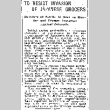
doc
To Resist Invasion of Japanese Grocers. Retailers of Seattle to Meet on Monday and Discuss Campaign Against Orientals. (May 3, 1914) (ddr-densho-56-248)
The Seattle Daily Times, May 3, 1914, p. 14
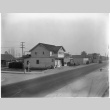
img
Airport Market on North Seaside Avenue (ddr-csujad-43-18)
Photograph number 953 of Airport Market on the corner of North Seaside Avenue and Scranton [Walk] on Terminal Island. A man in a suit is pictured standing in the doorway of the market and a woman is standing outside. Handwritten note on negative sleeve reads: Habitation near N.A.S. [Naval Air Station] and N.O.B. [Naval Operation Base] …
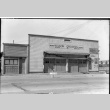
img
Wilson Grocery (ddr-csujad-43-61)
Photograph number 1201 of Wilson Grocery store on Terminal Island. The sign in front of the store reads: East San Pedro Tract 186A. Negative scan. See this object in the California State Universities Japanese American Digitization project site: ter_01_082
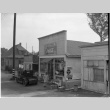
img
Yuguchi Market (ddr-csujad-43-13)
Photograph number 946 of Yuguchi Market on Terminal Island. A man is pictured walking outside the store. Handwritten note on negative sleeve reads: Habitation near N.A.S. [Naval Air Station] and N.O.B. [Naval Operation Base] Roosevelt Base T.I. (Terminal Island). Negative scan. See this object in the California State Universities Japanese American Digitization project site: ter_01_020
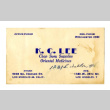
doc
K. C. Lee: chop suey supplies oriental medicines (ddr-csujad-5-170)
A business card of K. C. Lee, chop suey supplies, oriental medicines. A store in Los Angeles, California. See this object in the California State Universities Japanese American Digitization project site: oki_02_15_007

av
Interview with George Hamamoto, (audio) (ddr-csujad-56-1)
Sonoma County resident George Hamamoto was interviewed on June 20, 1978, by a Sonoma State University student for the North Bay Ethnic Archive Project. He discusses growing up in Sebastopol, the family grocery store, removal to Assembly Center in Merced, then incarceration at Granada (Amache) camp. Discusses organization and administration of camp, and return to Napa …
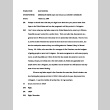
doc
Sam Maeda interview (ddr-csujad-6-18)
Oral history interview with Sam Maeda. See this object in the California State Universities Japanese American Digitization project site: SCRC_MAEDA_SAM
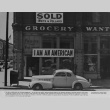
img
I am an American sign on the store front on December 8, 1941 (ddr-csujad-7-1)
Grocery store with a sign "I am an American" placed on its front on December 8, 1941. See this object in the California State Universities Japanese American Digitization project site: HMLSC_JA_f01
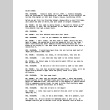
doc
Akira Yokomi (ddr-csujad-8-85)
Oral history interview with Akira Yokomi. Information on the oral history project is found in: csuf_stp_0012A; Glossary in: csuf_stp_0014. See this object in the California State Universities Japanese American Digitization project site: FCPL Yokomi, Akira
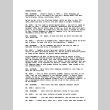
doc
George Masumi Sakai (ddr-csujad-8-95)
Oral history interview with George Masumi Sakai. Information on the oral history project is found in: csuf_stp_0012A; Glossary in: csuf_stp_0014. See this object in the California State Universities Japanese American Digitization project site: FCPL Sakai, George Masumi
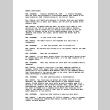
doc
Momoyo Jane Kubota (ddr-csujad-8-32)
Oral history interview with Momoyo Jane Kubota. Information on the oral history project is found in: csuf_stp_0012A; Glossary in: csuf_stp_0014. See this object in the California State Universities Japanese American Digitization project site: FCPL Kubota, Momoyo Jane
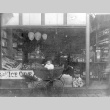
img
Baby in front of grocery store (ddr-densho-105-2)
Minoru Tsubota's family's grocery store in Kent, Washington. Child in front is Min's brother, Henry Hiroo, mother Fusano is standing in back.
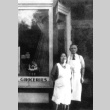
img
Owners standing in front of grocery store (ddr-densho-136-27)
This Issei couple operated the Latona Grocery Store from approximately 1935-1939. It was located at 319 NE 42nd Street in the Wallingford neighborhood of Seattle.
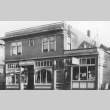
img
Latona Grocery Store (ddr-densho-136-21)
An Issei couple operated this grocery store from approximately 1935-1939. It was located at 319 NE 42nd Street in the Wallingford neighborhood of Seattle.
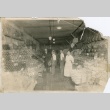
img
Group inside a grocery store (ddr-densho-321-479)
Caption on reverse: "Man third from left / is Takao Fujii - father / of Masatoshi Fujii / Circa 1920s."
